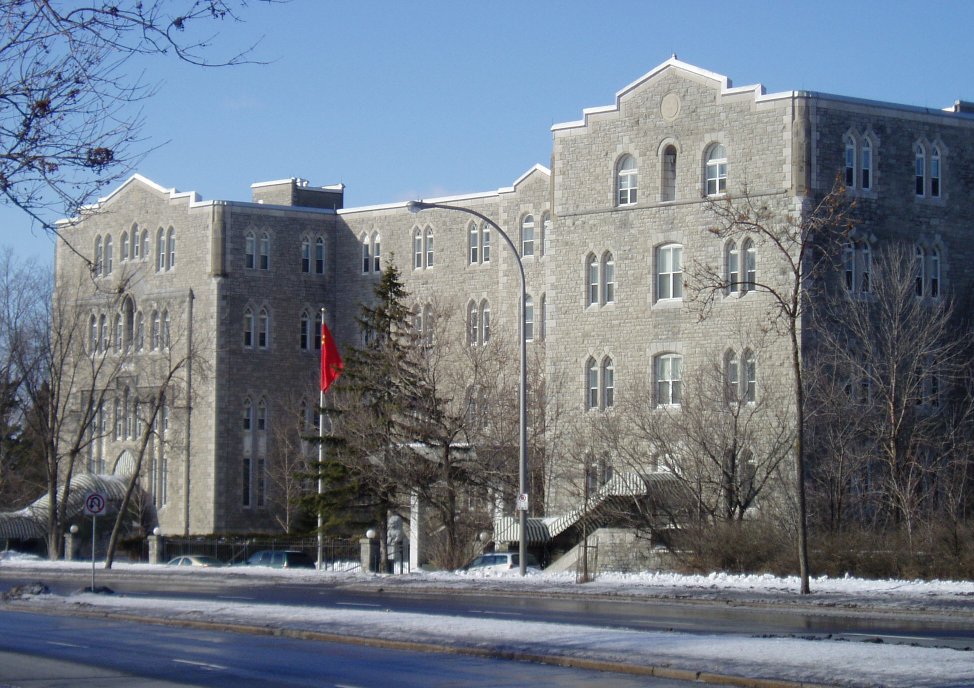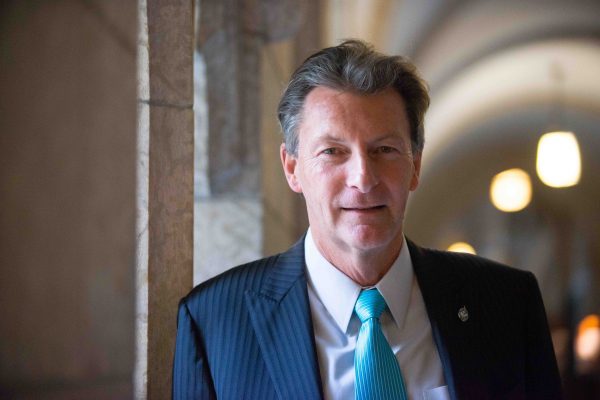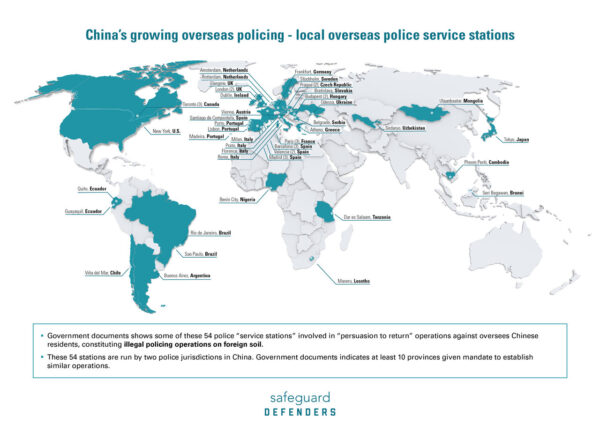
The Chinese Embassy in Ottawa seen in January 2005. (SimonP/CC BY-SA 3.0)
Lawmakers express concern about the reported stations
By
The issue of Chinese police stations operating in Canada and other democratic countries has been making headlines in recent weeks, and some governments have begun probing the alleged use of these stations to intimidate overseas Chinese.
Liberal MP John McKay said he felt a sense of “incredulity” when he first heard reports of existence of three unofficial Chinese police stations operating in the Greater Toronto Area.
“This is an egregious extension of extraterritoriality and is to be resisted in every way,” McKay told The Epoch Times.
“It’s just sort of like one more thing where [China has] penetrated deeply into Canadian society,” he said, noting other subversive activities by Beijing on Canadian soil, such as “trying to manipulate our democracy, or trying to manipulate students, trying to manipulate communications network routines, stealing of industrial patents, routine infiltration of university think tanks and labs.”
The three reported stations in Toronto—two in Markham and one in Scarborough, areas with large Chinese populations—are among over 50 overseas police services operated by two provincial-level police agencies in China, according to Spain-based NGO Safeguard Defenders.

Liberal MP John McKay in a file photo. (Matthew Little/Epoch Times)
“There is if you will an Interpol arrangement between the authorities in China and in Canada, but this is way beyond that,” McKay said. “This is essentially either bribing the authorities or coercing or forcing people to cooperate with Chinese authorities outside of the territorial jurisdiction of China.”
The stations, which are reportedly operated by Fuzhou Public Security Bureau in Fuzhou City, Fujian Province, and its counterpart in Qingtian County, Zhejiang Province, have been established in dozens of countries across five continents, according to Safeguard Defenders. The NGO reported the existence of the stations in a September paper investigating what it called the Chinese Communist Party’s “long-arm policing” and “transnational repression.”
While multiple Chinese state media reported that the stations were established to provide better services to overseas Chinese communities, Safeguard Defenders said the CCP has touted how these stations have been used to support a separate national campaign to fight telecommunications crime conducted by Chinese people living abroad. It said between April 2021 and July 2022, more than 230,000 overseas Chinese have been “persuaded” to “voluntarily” return to China to face criminal proceedings.
The study noted that “persuasion to return” is part of Beijing’s “involuntary returns” operation, which employs methods like “tracking down of the target’s family in China in order to pressure them through means of intimidation, harassment, detention or imprisonment into persuading their family members to return ‘voluntarily.’” It also includes approaching the targeted individual directly “through online means or the deployment of—often undercover—agents and/or proxies abroad to threaten and harass the target.”
“Whether the targets are dissidents, corrupt officials, or low-level criminals, the problem remains the same: The use of irregular methods—often combining carrots with sticks—against the targeted individual or their family members in China undermines any due process and the most basic rights of suspects,” the study said.
Non-suspects are also targeted, which “institutes a far-reaching ‘guilt by association’ paradigm,” it said.
“What’s worrisome to me in the bigger picture is the very difficult position that Chinese-Canadians find themselves in,” McKay said. “As China continues this activity—which it gives every indication that it will—it’s not a good future for people who are Chinese but are also Canadian.”
Conservative MP Garnett Genuis said he finds the issue is “very concerning.”

Conservative MP Garnett Genuis in a file photo (Courtesy of Garnett Genuis)
“The Canadian government needs to step up, respond to these reports, and take action to protect Canadian sovereignty and to address these as well as other instances where foreign states tried to influence and intimidate people here on Canadian soil,” he told The Epoch Times.
“There are some people who are critical of the Chinese government but are nervous expressing those criticisms because of what it could mean for their safety even here or for family members back in their country of origin.
“I think the threats in particular to people with Chinese origin are very significant and require further action.”
Erosion of Sovereignty
Global Affairs Canada said it is looking into allegations of unauthorized Chinese police stations in the country, while some European countries like Spain and Ireland are also initiating investigations.
Peter Dahlin, founder and director of Safeguard Defenders and co-author of the report, said in a recent Epoch Times commentary that an official from the Chinese Ministry of Foreign Affairs office in Shanghai has admitted that “Beijing cares little for the judicial sovereignty of European countries if they don’t serve China’s interests.”
“Bilateral treaties are very cumbersome” and “Europe is reluctant to extradite to China,” the anonymous official said, according to Dahlin. And because of this, the official said, Chinese authorities see nothing wrong with pressuring or using coercion to force victims back to China.
In a previous interview with The Epoch Times, Dahlin said that while his report revealed the more than 50 police stations run by two provincial-level police agencies in China—Fujian Province and Zhejiang Province—there could be more than 10 Chinese provinces that are running similar police stations abroad, though they have yet to be discovered.
He also noted that the CCP is known to have kidnapped targets living abroad, with his organization identifying 22 cases of kidnapping.
Former Conservative MP Kenney Chiu said the CCP has long engaged in kidnapping or coercion of dissidents, pointing to some pro-democracy activists who were “extradited” to China from Hong Kong and elsewhere.
“Those who pay attention realize that the CCP has been extending its influence and its brute force outside of its boundary,” he said.
“So this is not something new. What is new it is that it’s now being conducted … publicly and openly. It is true that these are not official police offices. However, to cooperate and to work with a foreign agent in that capacity, it’s something new to have official stations that are setting up in Canada.”
Chiu said the establishing of the police stations “is not a healthy development” and infringes on Canadian sovereignty.
“These are not something that is bilateral, with Canada’s blessing,” he said.
“The CCP wants to be able to persuade and affect and also infiltrate countries such as Canada in extending their strong-arm brute force [to] brutally control … Chinese who are overseas and the diaspora Chinese community.”
‘Not a Surprise’
Sen. Leo Housakos told The Epoch Times that while he is concerned about the reports of Chinese police services in Canada, it comes as no surprise.
“We’ve seen over the last few years, a number of reports that have been tabled before parliamentary committees by [the Canadian Security Intelligence Service], by the RCMP. Our security services in Canada have raised the red flag about the Communist Party of Beijing, infiltrating our institutions and infiltrating our democracy,” he said.
“We have heard reports from our security services and from Canadian citizens who have been intimidated by agents here in Canada. So it’s not a surprise that the Chinese state has gotten to the point where they have their security forces on our ground, and it’s a serious concern.”
Housakos said Canada sorely needs a foreign influence registry. Bill S-237, which he introduced, would require individuals acting on behalf of a foreign state to be registered and file a return, and would amend the Criminal Code to increase the sentence for intimidation if the offender acted on behalf of a foreign government.
“Foreign interference in our country is becoming more and more of a problem. And it’s not only in regards to the Chinese Communist Party, but countries like Iran, countries like Turkey, countries like Russia, all these authoritarian regimes,” he said.
“These nations have to be put on notice, and we have to be on guard in terms of their infiltration.”
